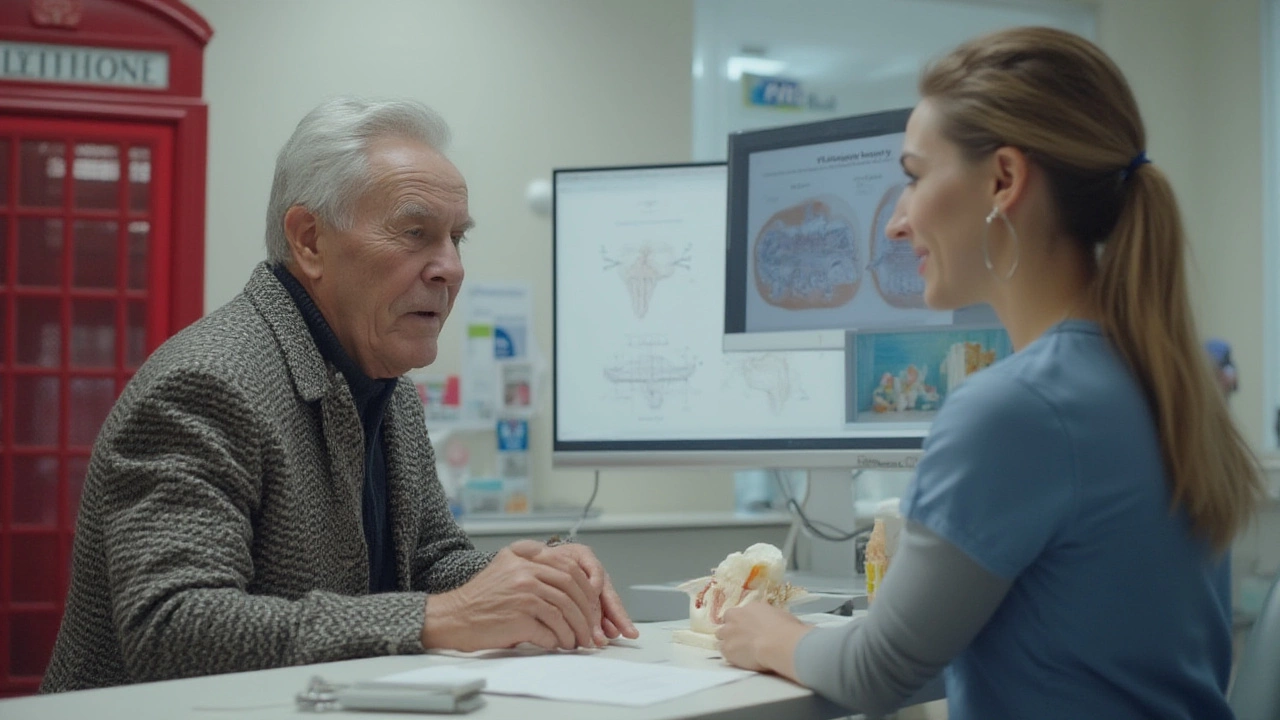 Jul, 26 2025
Jul, 26 2025
Try picturing this: a 78-year-old woman walks into a dental clinic hoping to chew a steak again without worry, or a 19-year-old guy with a missing front tooth wants a permanent fix. Age alone doesn’t stand in their way. Even though many assume there’s an upper age limit for dental implants, it's actually way more about your mouth's health, bone strength, and a few big-picture medical details. If you’ve ever assumed you’re too old for dental implants or maybe even too young for them, reality might surprise you. Let’s break apart this myth and get straight about when dental implants may not be on the cards—and why the answer delivers more hope and fewer hard stops than you’d think.
Why Age Isn’t a Deal-Breaker for Dental Implants
Dental implants have been around for about 40 years, with scientists constantly tweaking materials and techniques to help more people qualify for this tooth replacement option. The idea that you “age out” of implants comes from a few places: slow healing, worry about bone loss, or simply doctors playing it safe. But real-world data says something else. There isn’t some official cut-off—like 70, 75, or even 90—when you automatically become ineligible. The oldest documented dental implant patients? There’s a published case of a 92-year-old man getting his first implants. He healed well and was happily munching apples again within six months.
Now, it does get trickier with advanced age. Older folks can heal slower, especially if their immune system is run down or they’re dealing with osteoporosis. But here’s the wild part: more than 95% of implants succeed in healthy, motivated patients—even those in their late 70s and 80s, according to a German study from 2022. In the U.K., the majority of private dental clinics won’t turn anyone away solely for being “too old.” Instead, they focus on how solid your jawbone is, your gum health, and how well you can follow recovery instructions. So if your health is good enough for you to consider regular dental work, taking on dental implants is almost always on the table.
There’s a growing number of people over 65 getting implants each year. The American Academy of Implant Dentistry reports that over half a million implants are placed annually in the U.S., and the largest increase has been among those over 60. It isn’t hard to see why—living well into your 80s or 90s is more common, and people want to eat, talk, and smile without constant denture worries. And you can say goodbye to those “dentures in a cup” jokes—modern implants feel and function just like natural teeth once healed.
Fun fact: In Scandinavia, dental implants for seniors are so normal that the Swedish government covers part of the cost for citizens over 65. It's seen as a health investment, not a cosmetic extra.

How Age Can Complicate Dental Implants—And What Matters More
Okay, so why do some people get turned down? It all comes back to your medical status, bone quality, daily habits, and motivation. Here’s a quick look at what really matters if you’re thinking about getting implants at an older—or even very young—age:
- Jawbone Strength: You need enough bone to anchor the titanium post that supports the implant crown. Age itself isn’t the issue—it's that your jawbone can thin out due to gum disease, years of missing teeth, or osteoporosis. If your dentist says your bone is too thin, bone grafting can actually rebuild it in many cases. Studies show seniors’ bones can heal nearly as well as younger folks with the right care.
- Gum Health: Periodontal (gum) disease is the #1 deal-breaker, regardless of age. Untreated gum infection can quickly kill an implant. If your gums are healthy, your age matters a lot less. If not, treat the gum disease first—then revisit implants.
- General Health: Uncontrolled diabetes, advanced heart disease, or certain cancers can make healing risky. But well-managed versions of these conditions? Not usually a problem for dental implants.
- Medications: Some meds, especially high-dose steroids, anti-rejection drugs after organ transplants, or certain osteoporosis treatments, can interfere with bone healing. Bring a list to your dentist and they’ll help figure it out.
- Smoking: Still a big risk of implant failure at any age. Quitting (even temporarily around the surgery) boosts implant success rates massively—up to 98% in non-smokers, versus 80%-85% in heavy smokers.
- Age at the Other End: Kids & Teens: This one is stricter. Dental implants aren’t advised until facial bone growth is complete—usually late teens or early 20s. Put an implant in too early, and the bone keeps growing around it, messing up bites and smiles as the teen matures.
Let’s look at a comparison table to see how age stacks up against these other factors:
| Factor | Is It a Problem? | Can It Be Fixed? |
|---|---|---|
| Chronological Age (70-100) | No (if healthy) | Not needed |
| Jawbone loss (any age) | Yes | Bone grafting, sinus lift |
| Uncontrolled gum disease | Yes | Treat gum disease first |
| Unmanaged chronic medical illness | Maybe—not always | Coordinate care, stabilize illness |
| Heavy smoking | Yes | Stop smoking before and after surgery |
| Under 18 (bones still growing) | Yes | Wait until growth plates close |
If you check most boxes for good health and haven’t been ruled out for medical reasons, don’t worry about the candles on your last birthday cake. Dentists routinely place implants in patients over 85 if they’re the right fit… and there’s even data showing satisfaction rates in older patients are higher because they’re more motivated and less likely to “overload” their new teeth biting into random hard objects.

Tips for Successful Dental Implants as You Age
Here’s something most clinics won’t spell out: older adults often make better implant patients because they’re serious about the benefits—enjoying steak, biting into apples, ditching loose dentures. They’re usually more dedicated to the aftercare, too. Still, if you’re thinking about getting dental implants in your 60s, 70s, or later, a few smart moves can tip the odds even further in your favor.
- Get a Full Health Assessment: Don’t be shy about sharing all your meds, health issues, and past surgeries. Dental teams aren’t just looking at your teeth—they’ll check for conditions that slow healing and plan accordingly.
- Ask About Bone Grafting if Needed: If your jawbone is thinner due to age or years without teeth, bone grafting isn’t nearly as scary or expensive as it sounds. It can add a few months to the process, but it means the difference between a healthy implant and one that’s doomed to wiggle loose.
- Clean Your Mouth Like a Pro: Healthy gums matter more than you think. Brush twice daily, use floss or tiny dental brushes, and hop onto regular hygienist cleanings. Infection—not age—is the real implant killer.
- Be Patient with Healing: Some people over 70 heal a bit slower, especially if they’re on certain meds or struggle with dry mouth. Schedule regular follow-ups and don’t rush back to steak the next day after surgery.
- Include Your Doctor in Decisions: If you're on complicated meds or have heart issues, your dentist may want to collaborate with your GP or specialist. It’s all about dodging infection or healing problems before they start.
- Remember Denture “Fatigue” Is Real: Tired of denture glue and slipping plates? Dental implants are the only option that truly gives you back fixed, permanent teeth. Even patients in their late 80s say it’s “life-changing.”
Is there ever an age when implants are just out of reach? Yes, but it’s way rarer than most people think. If you’re bed-bound, severely immune compromised, or your life expectancy is short due to a terminal illness, implants may be off the table for practical reasons. But if you’re mobile, social, and eager for better chewing power, your age is usually just a number.
So next time someone tells you “You’re too old for dental implants,” hit them with the facts. It’s all about health, motivation, and how much you value biting into your favorite food again. The dental chair is waiting—no need to check your birthdate at the door.
